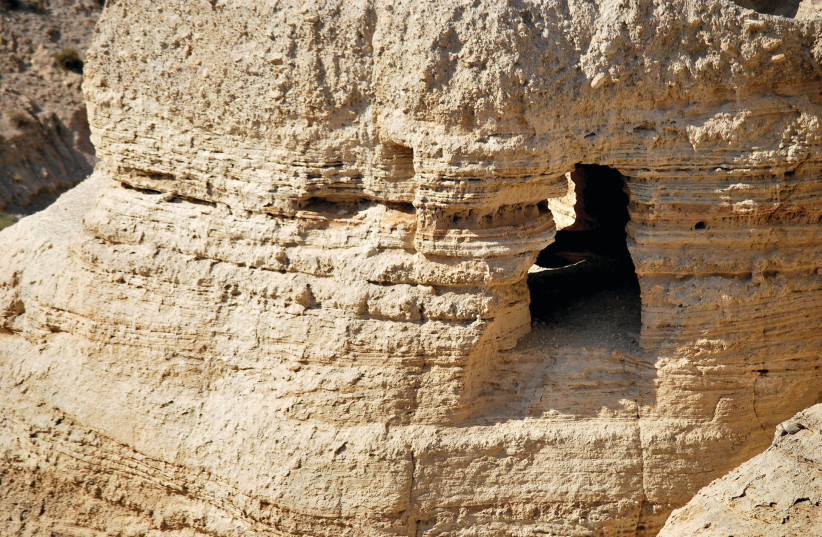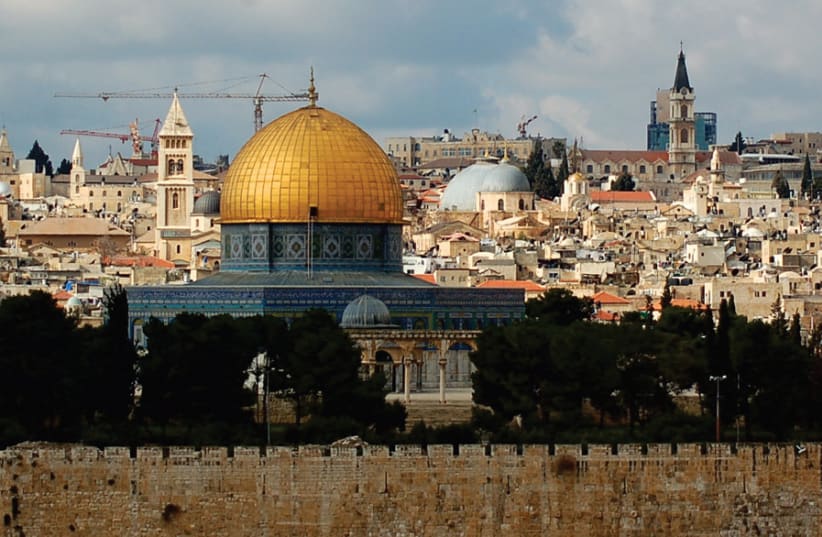Since The Da Vinci Code hit shelves nearly two decades ago, publishers have eagerly proclaimed a number of titles “the next Da Vinci.” But Ellen Frankel’s new novel, The Deadly Scrolls, book one in the “Jerusalem Mysteries” series, may be the first Jewish contender for the crown.
Set in modern Jerusalem and the desert ruins of Qumran, an American professor’s murder reveals his discovery of a lost Dead Sea Scroll, whose text encodes the secret hiding places of the lost Second Temple treasures. Meanwhile, the protagonist, Israeli intelligence agent Maya Rimon, races against the clock to stop a religious extremist from launching a deadly terrorist attack at the next Blood Moon, bringing the apocalypse to Jerusalem.
The page-turner, entangled with car chases, mysterious puzzles and Sherlockian logic, is targeted to a wide audience: Evangelical Christians, Orthodox Jews, Zionists and especially mystery lovers in general, “people who are interested the Middle East, interested in ancient history, especially around the time of the beginning of Christianity and the destruction of the Second Temple,” Frankel told The Jerusalem Post.
“I also hope to appeal to Evangelical Christians and Orthodox Jews who are fascinated with Jewish history,” she said. “I would say I’m hoping for a fairly broad audience.”
Frankel said she’s been writing since age 10. The author of 11 books who served as editor-in-chief and CEO of the Jewish Publication Society (JPS) for 18 years before retiring in 2009, is a seasoned writer, but The Deadly Scrolls, released last month, is her first adult fiction series. She said writing fiction was a different experience, one that required a lot of persistence.


“I’ve spent the last eight years writing this series. This is not the first novel I’ve attempted, it’s about the seventh. The others are in my closet, in boxes. What I often tell beginning writers is you can’t get a B+. You either get an A or an F. Either they accept your novel or they don’t. I tried with the earlier novels, I came close a few times, but ‘close’ is as far as a complete rejection.”
Even with the new series, Frankel hasn’t fully abandoned nonfiction. The story centers around a real historical artifact, the so-called copper scroll, whose many secrets remain undeciphered by contemporary scholars and treasure chasers. Despite decades of hunting, not a single one of these invaluable objects has ever been discovered.
Frankel, who splits her time between Sarasota, Florida and Cape Cod, Massachusetts with her husband Herb Levine, also a writer, has been to Israel 15 times. But research for her latest book did not include a trip to the Jewish state. “Unfortunately not,” she said with a laugh. “I relied on Google Earth and extensive resources.”
“A lot of people who have already read the book compliment me on how realistically I’ve represented Israel,” she continued.
It was Frankel’s work in the Diaspora, mainly at JPS, that sparked an interest in the Dead Sea Scrolls. “I edited a book called Reclaiming the Dead Sea Scrolls,” she recalled. “They were the property of Christians, and Jewish scholars were kept away, until the Six Day War. I learned a lot in reading and editing that book.”
Frankel said she learned even more by working with an actual Dead Sea Scroll for book research. “Exciting discoveries remain to be made,” she said. “There have been about a thousand whole and fragmentary scrolls found so far. There are still explorations going on, so I anticipate there will be other caves uncovered and other stashes of scrolls. Scrolls that have been too corrupted to read, new technology will allow us to read them. The story of the Dead Sea Scrolls is far from over.”
The Deadly Scrolls features a protagonist heroine with a modern Orthodox love interest at a time when religious affiliation, especially among young people, is on a significant decline, with three in 10 US adults religiously unaffiliated, according to a 2021 Pew Research Center survey.
What impact, if any, might Frankel’s series have on that trend? Could it stimulate interest in religious history, or might it portray religion as extreme and destructive?
Frankel ensured the former. “This kind of book, a mystery packed with history, is a pleasant way to get your lessons in Judaism without having to go through any ritual. My hope is that young people, who may be shying away from affiliation, will enjoy reading The Deadly Scrolls because they will learn all about ancient Jewish history and modern Israel in a way that is pleasurable.”
“The first book is in the same vein as [Netflix series] Shtisel or Unorthodox, where it touches upon the Orthodox world,” she said. “The love interest isn’t ultra-Orthodox, but through his more modern relationship with a woman and struggles to open himself up, he is looking over his right shoulder to monitor.”
The third volume, which Frankel is writing currently, will also have a component of ultra-Orthodoxy, she said. “Every book in the series will intersect with the ultra-Orthodox world.”
The second volume, The Hyena Murders, due out in November 2022, features a serial killer targeting an Ethiopian member of the Knesset and his family. There has been much criticism of Israel for the way it has integrated Ethiopian olim over the past 30 years, a topic Frankel said is the heart of the novel.
“In the course of the mystery, the reader is introduced to the negative experiences Ethiopians have confronted, to the biases and prejudices against Ethiopian Jews among white Israelis, and some of the failures and successes of integration and assimilation.”
FEWER YOUNG people today read books, including Frankel’s own grandchildren, who she said prefer to get their information graphically or online. But the author remains adamant that the Internet can’t replace fiction stories.
“Some people are announcing the death of the book,” she said. “I don’t feel that way at all. Reading is changing in that some people read online rather than hard copy, but that doesn’t impact the future of the book.
“Reading in a Kindle format is the same as reading it in print. The big difference is between fiction and nonfiction. With nonfiction, you may prefer to just look up a fact online.
“But the experience of reading a novel cannot be abbreviated. You still want a story with a beginning, middle and end. You want characters with all the twists and turns, and that can’t be shortened with an article or a post. I don’t think fiction is endangered by the Internet.”
Those who remain apprehensive about picking up a book may still be able to relish in the thriller. Frankel said she has film and television rights to The Deadly Scrolls. “A Hollywood lawyer is pitching the story to producers and we’re hopeful someone will bite.”
